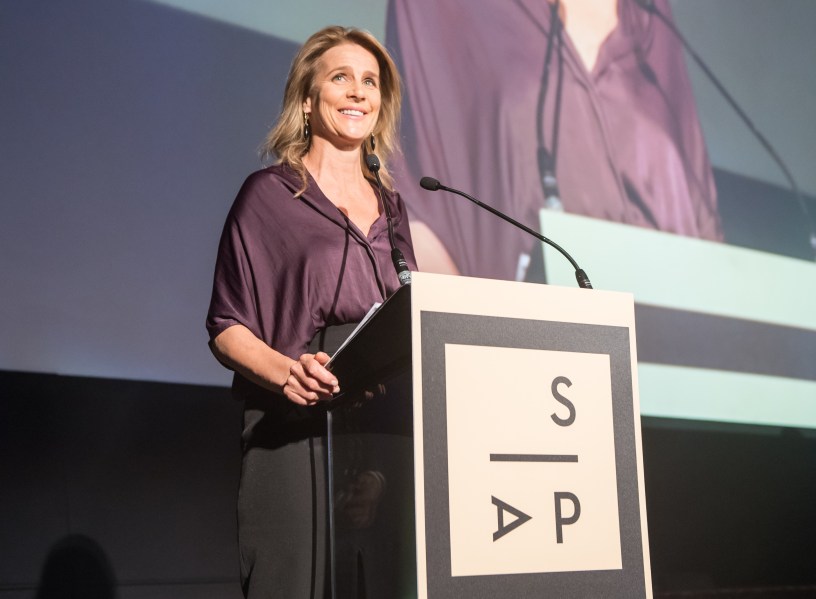Rachel Griffiths at Screen Forever.
After 25 years as an actor Rachel Griffiths made a discovery which shocked her while negotiating her fee to produce her first film, the Michelle Payne biopic Ride Like a Girl: Most feature producers get paid peanuts.
Presenting at the Screen Producers Australia (SPA) Awards at Screen Forever last month, Griffiths told producers: “I realise now you make no money, you have no power and you are exhausted. That’s a very new revelation to me.”
She strongly recommended producers tell agents how little their cut can be after relating a discussion she had with her agent, Shanahan Management’s Ann Churchill Brown.
After crunching the numbers on her producer fee, she asked, “Did you realise Ann, that’s all we’re getting?” The agent replied “No Rachel,” which made her think there may be a bit more upside for her on the production which will star Teresa Palmer, Sam Neill and Jacki Weaver and which marks her debut as a feature director.
Still, the point is well made. If experienced and successful actors like Griffiths were blissfully unaware of how little producers typically earn per picture, it’s highly likely the wider screen industry has not fully grasped the issue.
To try to remedy the situation SPA has reiterated its calls for producers to be better compensated during the often lengthy development process and for the Producer Offset funding to be platform neutral.
“Feature film producers these days are among the most poorly paid in the entertainment sector, particularly for the amount of work over very long periods,” SPA CEO Matt Deaner tells IF.
“The backdrop to a lot of negotiations across the industry is a misguided thinking that money somehow is being captured by producers. It’s not. Everyone should be thinking about the overall amount of finance available and how to work to build that.
“We are campaigning for better funding for feature films and a platform neutral approach to the offset, allowing more films to be made.
“Also more consideration should be given to how producers are remunerated during development – it isn’t sustainable and the potential for upsides aren’t working as a compensation to that process anymore.”
As Sue Maslin revealed to IF, she earned just $14,000 in producer fees during the five years she spent developing the script of The Dressmaker.
According to SPA, the average development time for feature films in Australia is five years, during which time producers earn almost nothing. If the film is financed, producer fees are effectively back pay and recompense for the long years spent acquiring and developing the intellectual property. In order to get the film made and earn anything at all, SPA estimates many producers are doing what Sue Maslin had to do – reinvest their producer fees into the film.
This results from the challenges in raising the gaps in financing in a difficult market with limited Screen Australia equity investments, caps on above-the-line eligibility for the Producer Offset and where large amounts of funding still need to be raised from a combination of distributors, sales agents, private investors and post-house reinvestment.
So the producer fills the gap by often reinvesting all or part of his or her fee, which may never be recouped.
Overall, feature budgets are not rising except for some top-end films where the inflation is due primarily to ballooning performer fees. In fact, many producers are being forced to cut budgets to get films financed, particularly those which are primarily focused on the domestic market.
Deaner concludes: “Films do not get financed without producers driving them. As feature film producing becomes less sustainable, unless we start to develop different strategies here we will make less and less films which will affect everyone who works in the industry and damage our global standing as one of the world’s leading creative film industries.”



